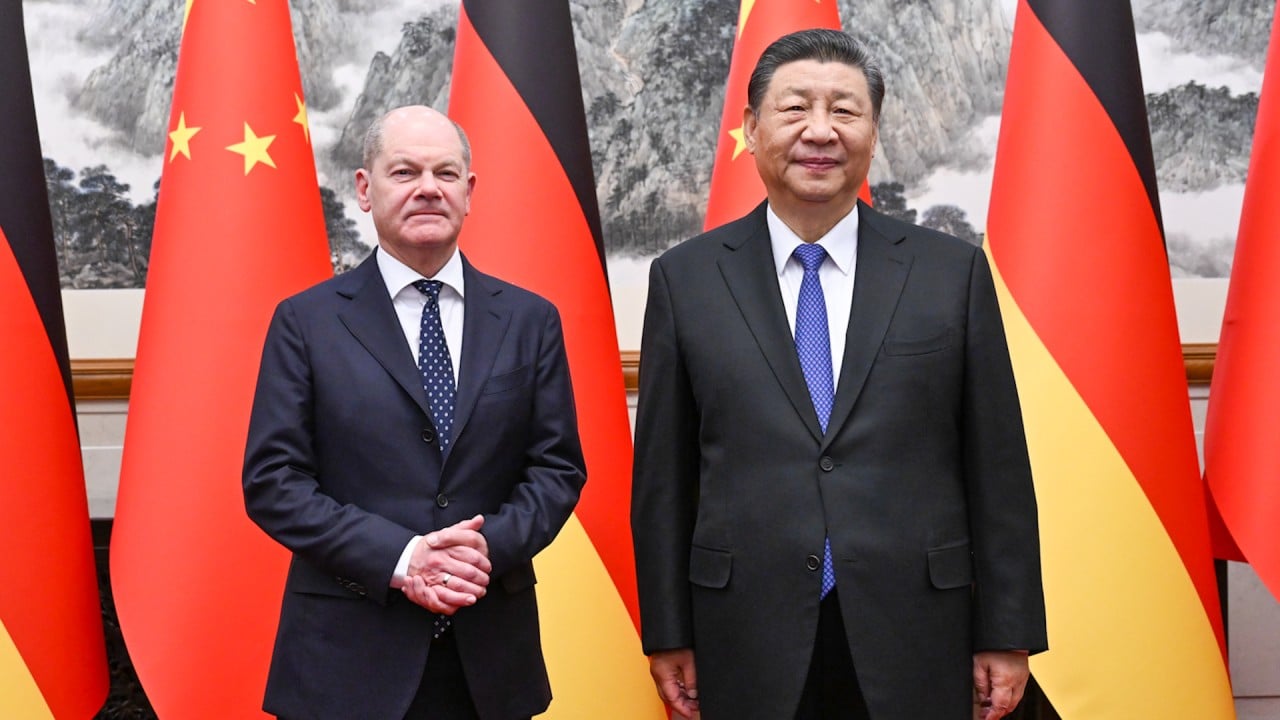
EU turns up the heat on China as Xi Jinping readies for 3-nation tour, with fiery Paris talks on the cards
- European Commission chief Ursula von der Leyen to meet Chinese President Xi and his French counterpart Emmanuel Macron in Paris to discuss China ties
- Xi’s trip comes amid barrage of EU trade and competition tools mostly targeting Chinese firms, including dramatic raids in the Netherlands and Poland
European Union trade, competition and digital authorities have been cracking down on Chinese firms in increasingly dramatic fashion, while its sanctions officers are turning up the heat on companies accused of funnelling European-made goods to Russia’s war machine.
While the two-day summit in Paris and the Pyrenees mountain range in southern France will see a series of business deals signed, observers and officials are watching closely for how Macron will address the economic grievances.
“Beneath the diplomatic veneer, obstacles are piling up and the areas of cooperation between the two countries are shrinking,” Julienne said, referring to the France-China relationship.
In Brussels this week, von der Leyen was briefed on the rapid-fire deployment of an arsenal of trade and competition tools that have largely targeted Chinese firms.
At the heart of the barrage is a belief that subsidies in the Chinese economy are distorting the European market, with deep-rooted fears that overcapacity in China will mean a relatively open EU is flooded with cheap Chinese imports.
‘Don’t jump to conclusions’: China needs balance amid US, EU overcapacity fears
The commission is expected to slap import duties on Chinese-made EVs before European elections next month, with Politico reporting on Friday that companies in China were refusing to cooperate with the commission’s investigation.
The raids, which Chinese business groups said went on for four consecutive days, were carefully calibrated to send political messages to Beijing.
Going after a company with deep links to the Chinese Communist Party – Nuctech is an offshoot of Tsinghua University and was previously run by Hu Haifeng, son of China’s former president Hu Jintao – was seen to show the EU’s concern at the growing conflation of party and corporate interests.
Meanwhile, with Xi’s trip expected to result in the establishment of more Chinese hi-tech manufacturing on European soil, the Nuctech raids were pointed.
In 2009, the bloc slapped anti-dumping duties on the firm’s cargo scanning systems, saying they were being sold in Europe below the prices at which they were sold in China.
EU officials point to the subsequent expansion of Nuctech’s manufacturing base in Poland as a lesson to be heeded today: if Chinese EV firms targeted by an anti-subsidies probe set up factories in Europe, they will not be safe from the anti-subsidies regulation should state handouts persist unabated.
The commission has also launched probes into market access in China’s medical devices procurement sector, and digital investigations into the behaviour of Big Tech companies TikTok, Shein and Ali Express.
Ali Express’s parent company is Alibaba, which also owns the South China Morning Post.
Last week, the European Parliament voted to adopt stringent new laws targeting forced labour which also require big companies to conduct forensic audits of their supply chains in China and elsewhere for human rights, environmental and labour violations.
A proposal on research security which will see collaboration with Chinese state-linked actors discouraged within the EU is expected to be advanced later this month.
On each front, the commission has enjoyed strong support from Macron.
Germany’s China shock: as Scholz leaves Beijing, alarm raised about economic ties
“On the economic security front, the French government has agreed with most of it, if not all of it, from the very start. France has been a strong proponent of this agenda, and goes even further on things like European preferences for public contracts,” said Mathieu Duchâtel, director of the Asia programme at the Institut Montaigne, a Paris-based think tank.
“There are issues on who decides what, between member states and the commission, but for me, there’s been great coherence in the French approach to this.”
After France, Xi will go to Serbia and Hungary for what are likely to be less uncomfortable talks with China’s primary European partners. But it is the French date that is being watched most closely in Brussels.
One insider said his live-streamed press conference was “like a hostage video”, due to his perceived unwillingness to criticise Chinese policies and voice support for the EU’s de-risking agenda.

Macron and Scholz dined in Paris together with their wives on Thursday, according to reports, during which they swapped notes on China.
Noah Barkin, an analyst at the German Marshall Fund of the United States, reported in a newsletter this week that Macron would invite his German counterpart to join him with von der Leyen in Paris.
Such a configuration would have mirrored Xi’s last trip to France in 2019, when Macron was joined by the then-commission chief Jean-Claude Juncker and former German chancellor Angela Merkel.
However, the latest reports say Scholz has declined the invite, citing plans to visit the Baltic nations instead.


